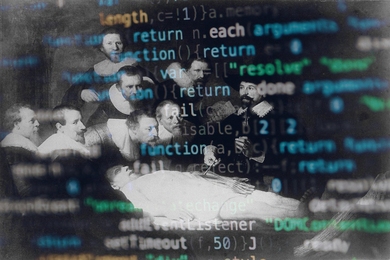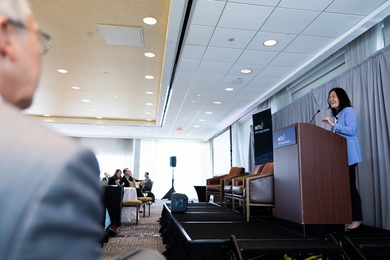After Chancellor Phillip Clay announced a 45-day "open discussion" period during which community members should work together to come up with an alternate dining plan, students aired grievances and voiced concerns about the administration's proposed changes to campus dining at last Wednesday's town meeting attended by about 100 students.
Clay said that student reaction to the proposed dining plan, including a petition signed by an estimated 2,000 people, "reflects a lot of work and thought and passion" and "points to a need to go back to first principles." He said the Campus Dining Review Board would be expanded immediately to include more student representation, and that during the next six weeks, the board "would be free to pursue options that don't include required participation."
One element of the proposed plan that was vociferously denounced at the meeting was mandatory meal plan participation. Students also expressed skepticism--with outbursts of laughter, hisses and shouts--about the Institute's willingness to consider alternate vendors and contract arrangements.
Clay acknowledged that students had "ample reason for being distrustful" about campus dining. "Over the last few years there have been a number of proposals, most of which degraded campus dining. Our goal is not to degrade campus dining," he said.
"But I have to be honest. Going forward, there has to be a Plan B which would go into effect in the event that another workable solution isn't agreed upon. Plan B would include mandatory dining next year for freshmen only, and incentives to encourage voluntary participation that would be attractive to other students, faculty and staff," Clay said.
Other concerns voiced by students included the desire to continue cooking their own meals and to maintain the mealtime traditions of certain groups of students. Those groups, which include fraternities, sororities and independent living groups as well as other student communities, vary from the women's track team--which prepares and eats meals together the night before meets to ensure the nutritional content is appropriate for their needs--to international student groups who like to cook and share their countries' flavors.
Rich Berlin, who directs the Office of Campus Dining (created in 1998 in response to the report of the Task Force on Student Life and Learning), said he had received "hundreds of e-mails on the topic" of the dining proposal and hoped the community could "move forward" to find ways of improving service.
REACTION STRONG
The audience in Room 10-250 applauded when one student said she believes a new plan should "make as little distinction as possible between freshmen and other students."
"I don't plan to sleep tonight. I have three days of work to complete. I'll eat twice in this period. Your dining plan doesn't meet my needs and I don't ask it to," said another student, who worked on his laptop computer during the meeting. "But the proposed plan would have me paying for" that participation.
Berlin said that at other schools, he's set up plans where you can order food in advance and get it delivered until 2 a.m. "We already have vendors delivering on campus at 2 a.m." shouted a student in response. Berlin explained that it might be possible to negotiate to have some of those vendors included in the meal plan.
Another student questioned whether new vendors would imitate the Burger King in Lobdell, which he claimed charges higher prices than the Burger King in Central Square.
"No," Berlin responded.
Phillip Walsh, director of the Campus Activities Complex, responded to a question about using the MIT meal card to purchase food at Star Market. "There has been some discussion of that," said Walsh. "Star is one of the vendors that could bring a lot of value to self-cooking on campus."
Dean for Student Life Larry Benedict responded to a student who asked what "power" the dining board would have, what the process would be, and what deadline had been set for proposals.
"In the past, [the dining board] was more of a review board. Now it will take in information and, with consensus on the board, bring forward a proposal or series of proposals which will go through me to the upper echelons of the university," Benedict said.
Clay's response to student concerns was published on Sept. 28 as a column in The Tech and is also on the News Office web site.
QUIET MENTAL HEALTH TALK
The second hour of the town meeting was dedicated to discussion of the mental health task force proposal. This latter half of the meeting took on a much friendlier, more intimate tone, in part because most of the audience dispersed following the dining discussion and the remaining 15 or 20 people moved nearer to the front of the room.
Answering questions from the audience and asking a few of their own were Dr. Kristine Girard, a staff psychiatrist, alumna and co-chair of the task force; David Mellis, a senior in mathematics and former task force co-chair; Dr. Peter Reich, head of Mental Health; and task force co-chair Efrat Shavit, a senior in linguistics and philosophy.
Girard explained that a randomly distributed survey had been given to 500 undergraduates and 500 graduate students and used to help create changes and recommendations. In addition to the increased hours, staff and accessibility of the Mental Health service which are already being implemented, the task force proposed that the Institute:
- Create a standing committee on mental health
- Develop communication protocols around critical incidents and define limits of confidentiality
- Clarify medical emergency leave policy
- Consider mandatory MIT insurance
- Create an administrative coordinator of campus support services position.
Questions and comments at the meeting focused on getting beyond the "getting-help-is-not-allowed-at-MIT" attitude and the need to create a stronger sense of who or where students should turn when they're in trouble.
"Would a single person you could talk to or visit, who could advise you where to go, be helpful to you?" asked Shavit, who said that the proposed administrative coordinator with an office on the Infinite Corridor could do just that.
A version of this article appeared in MIT Tech Talk on September 19, 2001.




